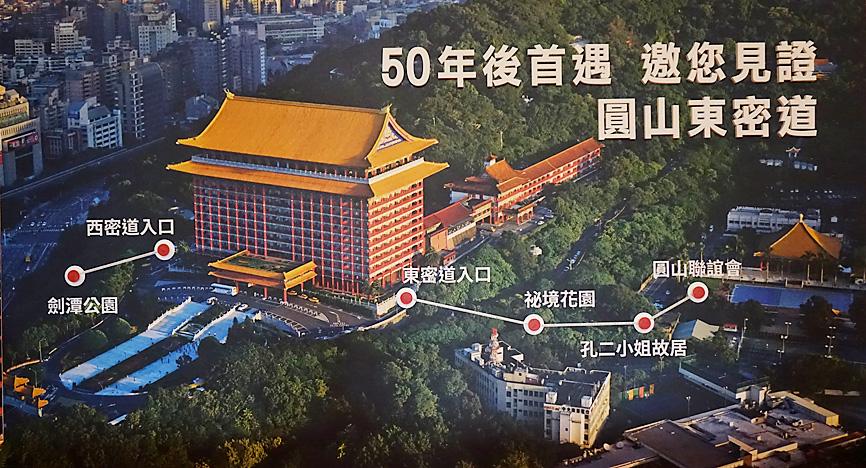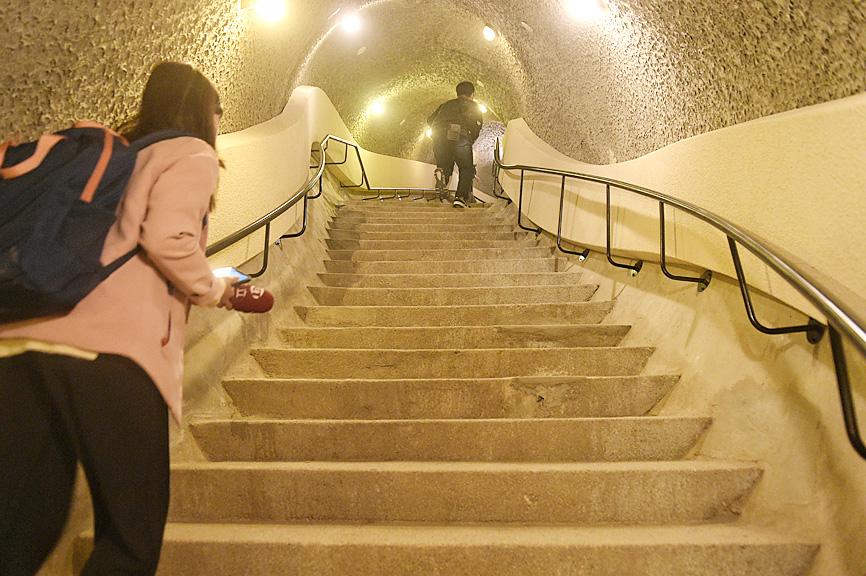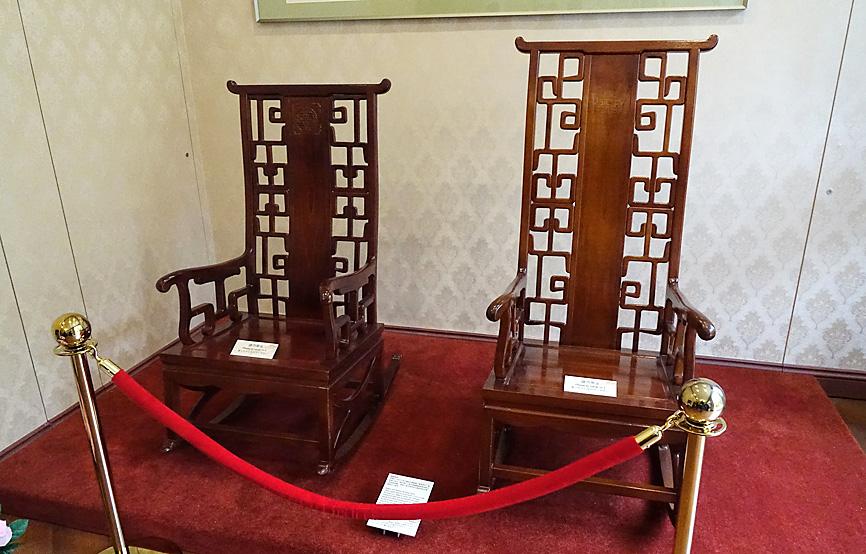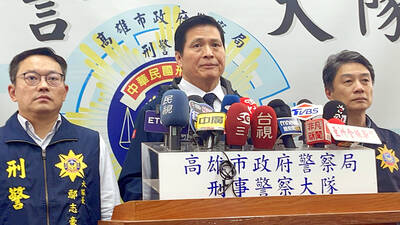An underground tunnel in the east wing of the Grand Hotel in Taipei that once served as an emergency exit for former president Chiang Kai-shek (蔣介石) was yesterday opened to the public for the first time since it was built 50 years ago.
A passage in the west wing of the hotel has been open since September 2019, drawing more than 50,000 visitors within three months of its opening. Last year, about 170,000 visited the west tunnel, the hotel said.
As tours of the west tunnel were warmly received, the hotel began renovating the east passage more than a year ago to open it to the public, it said.

Photo: Chang Chia-ming, Taipei Times
With the opening of the once-secret passages to guided tours, travelers can better understand the history of the Grand Hotel, it added.
The tunnels, designed to evacuate Chiang and his guests in the event of an emergency, were added to the hotel’s plans in 1970, when construction had begun on the main building, the hotel said, adding that it is the only international hotel with such passages.
In addition to its main architect, Yang Cho-cheng (楊卓成), the hotel invited a German-American engineer with extensive experience in building military bunkers during World War II to design the tunnels, it said.

Photo: Chang Chia-ming, Taipei Times
Visitors to the 67m-long east passage first descend an 84-step staircase before continuing down the tunnel.
The spiral passage helps protect evacuees from attackers and bullets, the hotel said.
Walls inside the tunnel have an uneven surface to absorb sound, it said, adding that 43 explosion-proof lamps were installed to prevent injuries from glass shards during evacuation.

Photo: Chang Chia-ming, Taipei Times
The passage leads to a garden, which was previously the site of a Japanese temple. The former residence of Kung Lin-wei (孔令偉), who was the hotel’s first manager and a niece of Soong Mayling (宋美齡), Chiang’s wife, was at the end of garden, the hotel said.
As people are also curious about Kung’s mysterious lifestyle, the residence would also be opened to visitors for the first time, it added.
The 85m-long west passage has a 20m-long slide next to the staircase, which was used to evacuate anyone unable to use the stairs.
For the east passage’s opening, the hotel created seven state banquet menus from the more than 200 dishes it has prepared for presidents, from Chiang to President Tsai Ing-wen (蔡英文).
A historic tour package is available, which includes a visit to the east passage, the Chiang Kai-shek Shilin Residence in Taipei’s Shilin District (士林) and National Revolutionary Martyrs’ Shrine, along with a presidential meal set and accommodation at the hotel.
The east passage would initially be limited to customers joining as part of historical tours, corporate customers and state banquet diners, due to the passage’s limited capacity, the hotel said.

Twenty-four Republican members of the US House of Representatives yesterday introduced a concurrent resolution calling on the US government to abolish the “one China” policy and restore formal diplomatic relations with Taiwan. Led by US representatives Tom Tiffany and Scott Perry, the resolution calls for not only re-establishing formal relations, but also urges the US Trade Representative to negotiate a free-trade agreement (FTA) with Taiwan and for US officials to advocate for Taiwan’s full membership in the UN and other international organizations. In a news release announcing the resolution, Tiffany, who represents a Wisconsin district, called the “one China” policy “outdated, counterproductive

Actress Barbie Hsu (徐熙媛) has “returned home” to Taiwan, and there are no plans to hold a funeral for the TV star who died in Japan from influenza- induced pneumonia, her family said in a statement Wednesday night. The statement was released after local media outlets reported that Barbie Hsu’s ashes were brought back Taiwan on board a private jet, which arrived at Taipei Songshan Airport around 3 p.m. on Wednesday. To the reporters waiting at the airport, the statement issued by the family read “[we] appreciate friends working in the media for waiting in the cold weather.” “She has safely returned home.

ON PAROLE: The 73-year-old suspect has a criminal record of rape committed when he was serving in the military, as well as robbery and theft, police said The Kaohsiung District Court yesterday approved the detention of a 73-year-old man for allegedly murdering three women. The suspect, surnamed Chang (張), was arrested on Wednesday evening in connection with the death of a 71-year-old woman surnamed Chao (趙). The Kaohsiung City Police Department yesterday also unveiled the identities of two other possible victims in the serial killing case, a 75-year-old woman surnamed Huang (黃), the suspect’s sister-in-law, and a 75-year-old woman surnamed Chang (張), who is not related to the suspect. The case came to light when Chao disappeared after taking the suspect back to his residence on Sunday. Police, upon reviewing CCTV

TRUMP ERA: The change has sparked speculation on whether it was related to the new US president’s plan to dismiss more than 1,000 Joe Biden-era appointees The US government has declined to comment on a post that indicated the departure of Laura Rosenberger as chair of the American Institute in Taiwan (AIT). Neither the US Department of State nor the AIT has responded to the Central News Agency’s questions on the matter, after Rosenberger was listed as a former chair on the AIT’s official Web site, with her tenure marked as 2023 to this year. US officials have said previously that they usually do not comment on personnel changes within the government. Rosenberger was appointed head of the AIT in 2023, during the administration of former US president Joe